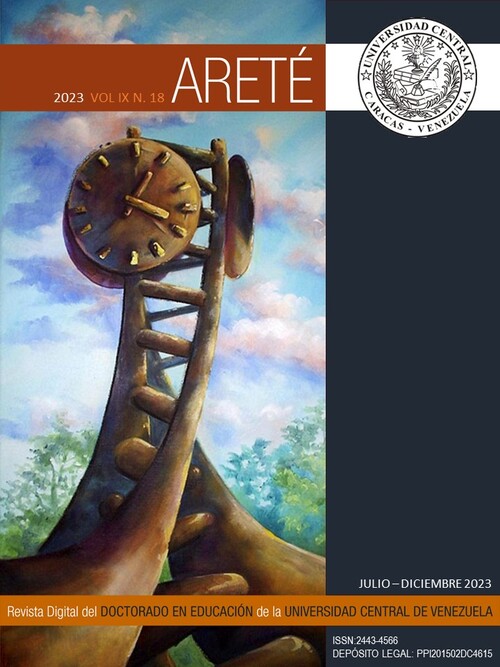Una experiencia educativa basada en proyectos de integración interdisciplinaria y de proyección social
Palabras clave:
Proyecto Pedagógico, Enseñanza de las Ciencias, xperiencia Educativa, Educación Jesuita, Educación TécnicaResumen
Este artículo describe una experiencia educativa llevada a cabo en el Instituto Técnico Jesús Obrero entre 1972 y 1975. Un grupo de docentes descontentos con la metodología educativa vigente buscó darle un sentido propio a la educación del Instituto, combinando la educación formal con la educación técnica y la formación en valores cristianos. Durante tres años, unos 500 estudiantes participaron en proyectos de campo enfocados en la enseñanza de las ciencias, lo que resultó en una doctrina y técnica curricular llamada Proyecto. Se analiza en particular el proyecto Ciencias-Agua, que recogió el aprendizaje de los proyectos anteriores y marcó un hito importante en la manera de trabajar en la institución. Esta experiencia dio lugar a otras experiencias educativas y terminó dando un estilo de trabajo institucional orientado a la Educación Basada en Proyectos. La investigación se hizo a través de fuentes primarias, entrevistas en profundidad a los docentes involucrados en el desarrollo del Proyecto y a jesuitas que fueron directivos en esa época.
Descargas
Citas
Álcivar, A., Vélez, M. y Tapia, G. (2023). Estrategias metodológicas del docente para el desarrollo del aprendizaje significativo de los estudiantes. Revista Dilemas Contemporáneos: Educación, Política y Valores. X(3). https://n9.cl/3ulf2o.
Barron, B., Schwartz, D. L., Vye, N.J., y Bransford, J.D. (1998). Doing with understanding: Lessons from research on problem and project-based learning. Journal of the Learning Sciences, 7(3-4), 271-311.
Bernal, C. (2010). Metodología de la investigación para administración, economía, humanidades y ciencias sociales. Pearson Educación.
Carvajal. L., Manterola. C., Rico. A. y Zambrano. A. (1975). Proyecto Ciencias-Agua. Una experiencia educativa. Jornada Nacional de Análisis del Sistema Educativo Venezolano. Universidad Central de Venezuela. Mimeografiado.
CERPE (1978). Renovación, politización, conflicto. Análisis de una experiencia educativa. Instituto Técnico Jesús Obrero 1972-1975. Autor.
Corbetta, P. (2007). Metodología y técnicas de investigación social. Mcgraw-Hill.
Díaz, F. (2003). Cognición situada y estrategias para el aprendizaje significativo REDIE. Revista Electrónica de Investigación Educativa, 5(2), 105-117.
García, N. (2008). La pedagogía de proyectos en la escuela: una aproximación a sus discursos en el caso del área de lenguaje. Revista Enunciación. 13, 79-95. https://revistas.udistrital.edu.co/index.php/enunc/article /view/1264/1707.
Hernández, R., Fernández, C., y Baptista, P. (2014). Metodología de la investigación. Mcgraw Hill.
Instituto Técnico Jesús Obrero (1973). Planificación de una Metodología Integral de la Educación. (2° y 3° del primer ciclo). Autor.
Krajcik, J. S., Blumenfeld, P. C., Marx, R. W., Bass, K. M., Fredricks, J., y Soloway, E. (1998). Inquiry in project-based science classrooms: Initial attempts by middle school students. Journal of the Learning Sciences, 7(3-4), 313-350.
Lacueva, A. (2015). Proyectos de aprendizaje en el liceo: hablan ocho docentes. Paradigma, Vol. XXXIII, 2, 27 – 63. https://n9.cl/qx96z
Martínez, M., Tapia, M., Naval, C. (2008). Aprendizaje servicio y responsabilidad social de las universidades. Ediciones Octaedro. https://n9.cl/wxpyz
Mayor, D. (2019). Ejes pedagógicos que articulan los proyectos de aprendizaje-servicio. Revista Internacional de Educación y Aprendizaje, 7(1), 29-36, https://doi.org/10.37467/gka-revedu.v7.1940
Narváez, E. (2006). Una mirada a la escuela nueva. Educere, 10(35), 629-636.
Neri, R. (1976). Jornada Nacional de Análisis del Sistema Educativo Venezolano. Conclusiones, proposiciones, recomendaciones, alternativas. Universidad Central de Venezuela.
Ortiz, M. y Hernández, O. (2023). Aprendizaje basado en problemas mediado por una aplicación educativa móvil. Revista Virtual Universidad Católica del Norte, (69), 43-69. https://doi.org/10.35575/rvucn.n69a3.
Prieto, L. y Padrino, L. (2009). La Escuela Nueva en Venezuela. El Perro y La Rana.
Puig, J. y Palos, J. (2006). Rasgos pedagógicos del aprendizaje-servicio. Cuadernos de Pedagogía. 357.
Ruiz, G. (2013). La teoría de la experiencia de John Dewey: significación histórica y vigencia en el debate teórico contemporáneo. Foro de Educación, 11(5), 103-124. http://dx.doi.org/10.14516/fde.2013.011.015.005
Descargas
Publicado
Cómo citar
Número
Sección
Licencia
Esta revista provee acceso libre, inmediato a su contenido bajo el principio de que hacer disponible gratuitamente la investigación al público, lo cual fomenta un mayor intercambio de conocimiento global.
Los autores que publican en Areté, Revista Digital del Doctorado en Educación, están de acuerdo con los siguientes términos:
- Los autores conservan los derechos de autor y garantizan a la revista el derecho de ser la primera publicación del trabajo, al igual que licenciado bajo una Creative Commons Attribution License que permite a otros compartir el trabajo con un reconocimiento de la autoría del trabajo y la publicación inicial en esta revista.
- Los autores pueden establecer por separado acuerdos adicionales para la distribución no exclusiva de la versión de la obra publicada en la revista (por ejemplo, situarlo en un repositorio institucional o publicarlo en un libro), con un reconocimiento de su publicación inicial en esta revista y no se use para fines comerciales.
- Los contenidos e imágenes que se incluyen en los artículos son responsabilidad del autor/es. Areté, Revista Digital del Doctorado en Educación, no se hace responsable de la información incluida en ellos.
- Los autores están de acuerdo con la licencia de uso utilizada por la revista, con las condiciones de auto-archivo y con la política de acceso abierto.
- Se permite a los autores difundir electrónicamente (por ejemplo, en repositorios institucionales o en su propio sitio web) la versión publicada de sus obras, ya que favorece su circulación y difusión más temprana y con ello un posible aumento en su citación y alcance entre la comunidad académica.
- En caso de reutilización de las obras publicadas, debe mencionarse la existencia y especificaciones de la licencia de uso, además de mencionar la autoría y fuente original de su publicación.







